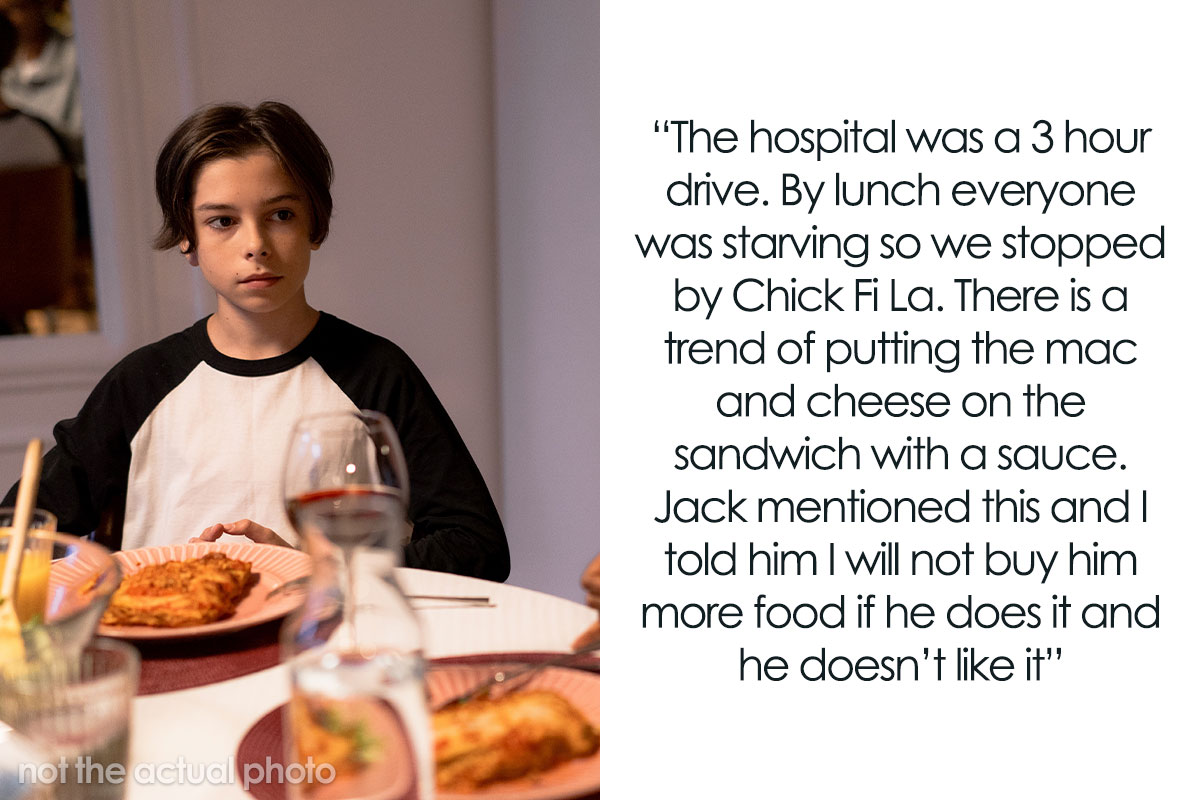
Dad Accused Of Starving Picky 14 Y.O. After He Ignores Warnings And Puts Mac ’N’ Cheese On Sandwich
Although picky eating is quite common among little ones – sometimes, we simply don’t know how to address it correctly.
Take this dad, for instance; he has a 14-year-old son called “Jack,” who fell victim to a mac and cheese sandwich trend. The man warned his offspring that if he didn’t like it, he wouldn’t buy him more food, and when that happened, he got blasted by his wife for starving their kid.
More info: Reddit | Charlotte Stirling-Reed
14-year-old picky eater decides to try a food trend that involves putting mac and cheese into a sandwich
Image credits: Katya Wolf (not the actual photo)
His father warns him that if he doesn’t like it, he won’t buy him new food
Image credits: Mike Mozart (not the actual photo)
Image credits: Oleksandr P (not the actual photo)
Image source: u/WolverineFragrant931
“AITA for telling my son I’m not buying him new food since he ruined his and he can be hungry for a few hours?” – this dad of a picky 14-year-old took to one of Reddit’s most judgmental communities, asking its members if he’s indeed a jerk for refusing to buy his kid more food when he ruined his sandwich. The post managed to garner over 12.4K upvotes as well as 3.4K comments discussing the situation.
Did you know that according to a 2022 piece from The Washington Post, “approximately 30% of people – nearly a third – identify as picky eaters”?
There is a plethora of reasons why some folks are incredibly selective when it comes to food; perhaps it’s genetics, limited exposure during childhood, texture sensitivity, cultural and social factors, negative associations, or just personal preferences – whatever it is, it’s worth noting that this behavior is pretty widespread, especially when it comes to children.
Now, Virginia Woolf, a groundbreaking British author, once said, “One cannot think well, love well, sleep well, if one has not dined well.” I’m sure that the majority of you agree with her statement – hence, it’s vital to find the right approach as early as possible to ensure that your dainty diner can grow up and enjoy all the beautiful cuisine of our world!
Managing such behavior can be tricky, of course, and the result is not guaranteed – however, there are a couple of things you could consider:
- The usage of fun plates and utensils to make meals visually appealing,
- Food arts such as smiley faces, animals, etc.,
- Finger foods,
- Mini portions of different foods to not overwhelm the little one,
- Creating fun tales around the food you serve,
- Introducing new things and mixing them with familiar favorites to make trying new stuff less intimidating,
- Letting them help with preparation.
Also, possibly the most crucial part, not only when it comes to picky eating but in parenting in general, is role modeling! Kids are highly influenced by the behavior of their close ones, so be mindful and all will work out.
That’s exactly what happens, but upon finding out, the man’s wife blasts her spouse for “starving” their kid
Image credits: cottonbro studio (not the actual photo)
Anywho, to get more professional feedback on the situation, Bored Panda reached out to Charlotte Stirling-Reed, a baby and child nutritionist, and owner of SR Nutrition, and posed her a couple of questions.
First, we asked Charlotte to share her thoughts on the parent’s handling of “Jack’s” picky eating and the incident at Chick-fil-A: “It’s actually not recommended to offer alternatives at mealtimes if meals are refused… Sometimes, if you’re home and have an accessible alternative available and it’s a one-off, then offering something else is OK (e.g., one time I used too much paprika and it put my kids off the dish, so I offered something different).”
“But generally speaking, offering alternatives usually results in MORE foods and meals being rejected in the long run and then an ever-diminishing number of ‘accepted meals.’ It’s also not practical for kids to be offered alternatives every day from a financial, time and practical (and food waste) point of view.”
We then wondered about some ways to improve communication between the parent and “Jack” to prevent arguments like the one described in the story: “It’s important to have some communications and boundaries when it comes to ‘rules’ around food and mealtimes. If alternatives are offered regularly, then that’s what will be expected, and parents changing their minds randomly might be confusing for children. Decide what rules work for your family – we only eat at the table, we eat together, we don’t offer alternatives but no one is forced to eat a meal or any part of it, for example.”
“This way, everyone knows where they stand. It sounds like the mum here DID communicate to her son that this was the option and what was on offer. Children will be OK if they skip a meal here and there – it’s overall patterns of eating we want to look at in children. What happens in one day, during one meal, matters much less than the patterns we see over a week or so!”
Last but certainly not least, BP pondered what strategies a parent can use to manage conflicts related to food and their child’s eating habits: “Practice what you preach – so key, role model what you want to see. Be consistent and try to have one message from all caregivers to reduce children’s confusion. Avoid ‘pressure’ to eat up – this has the opposite effect. Offer a variety at home so that, in time, they get used to and accustomed to a variety of different foods! This can help a wider variety be more acceptable to kids.”
What do you reckon, though, Pandas? Do you think the OP was indeed wrong in this scenario?

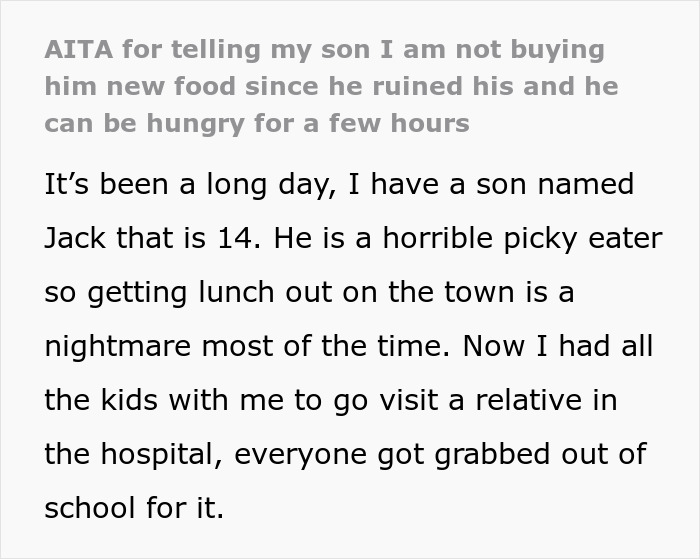
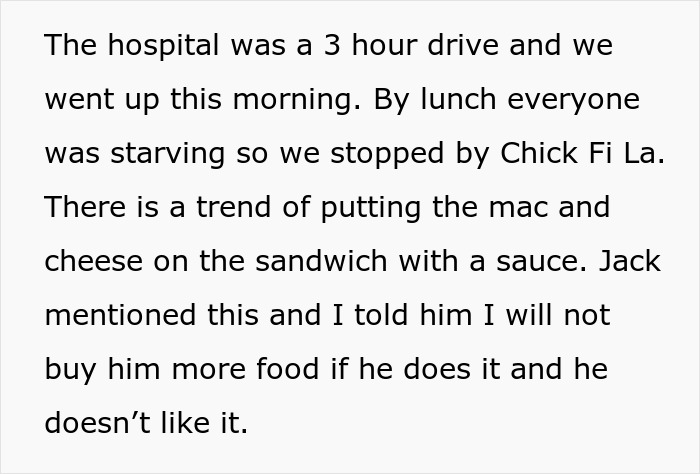

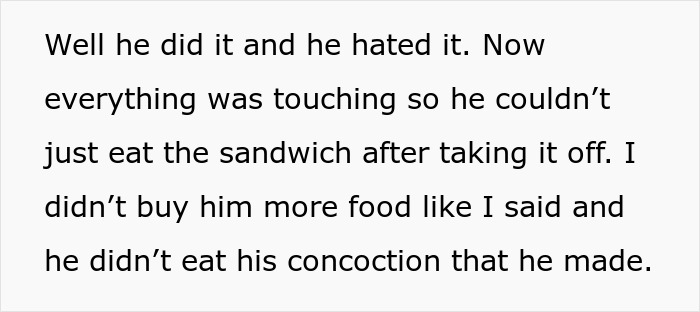


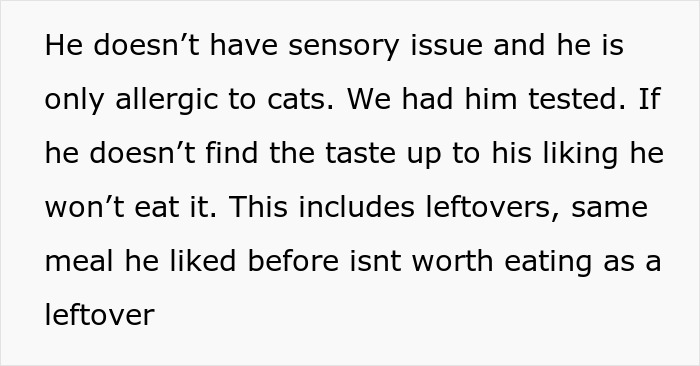
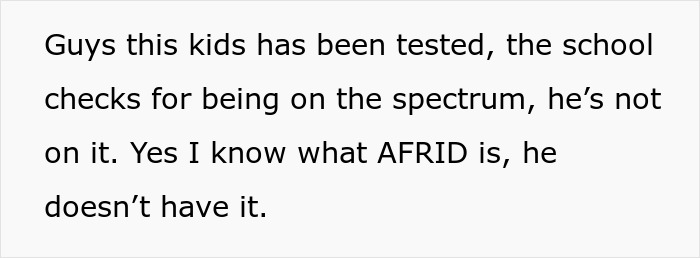

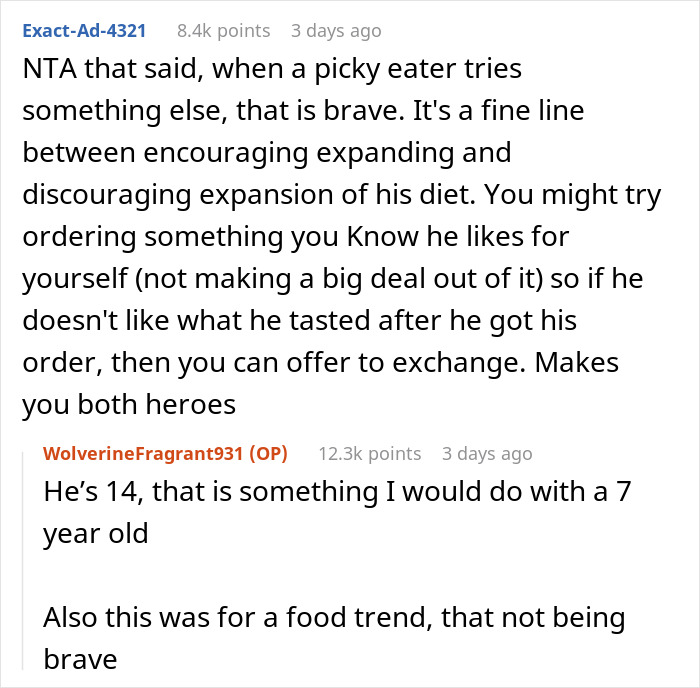
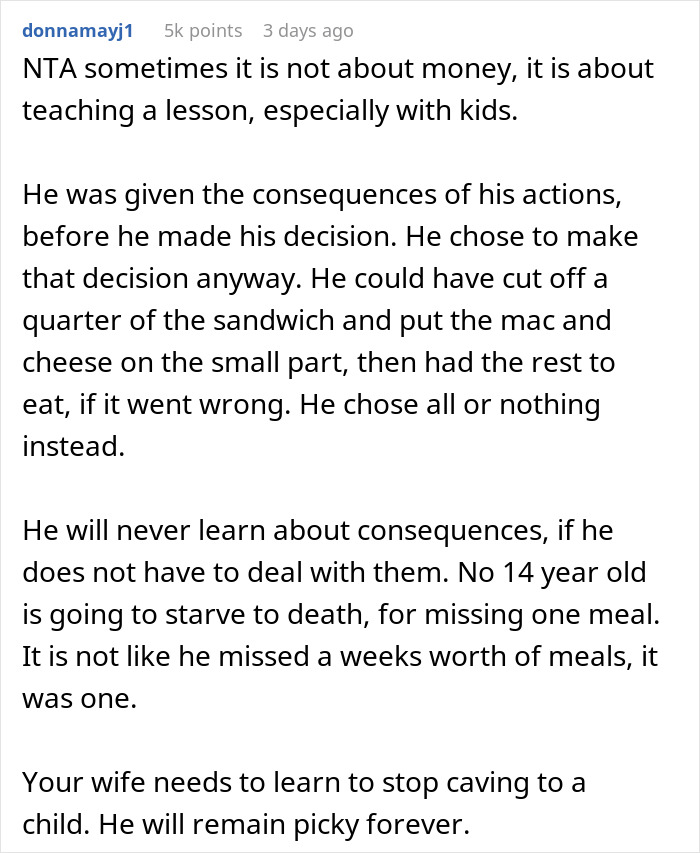

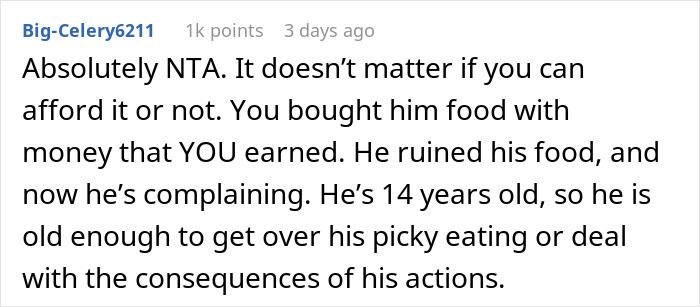
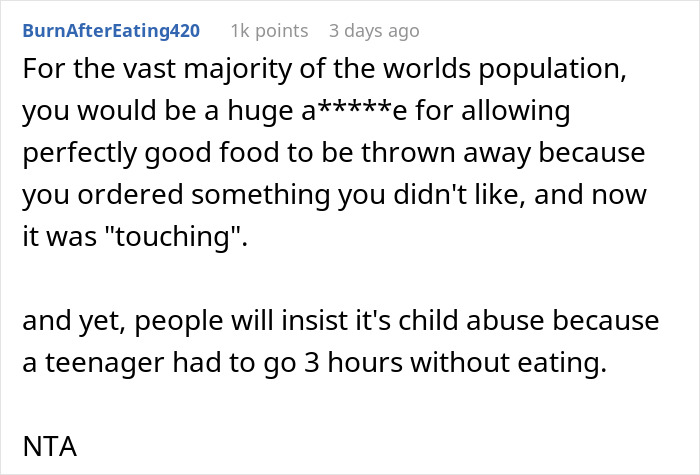
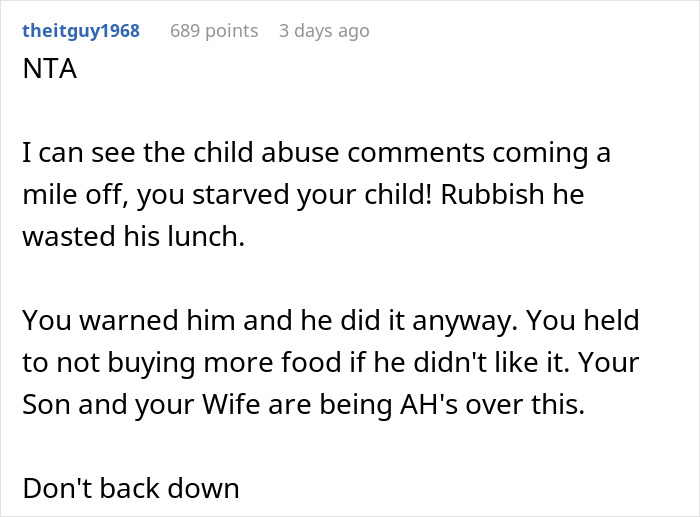
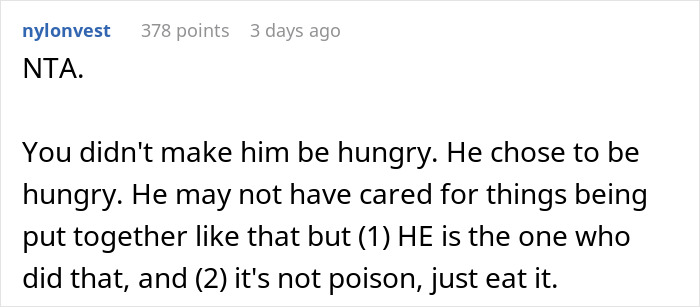
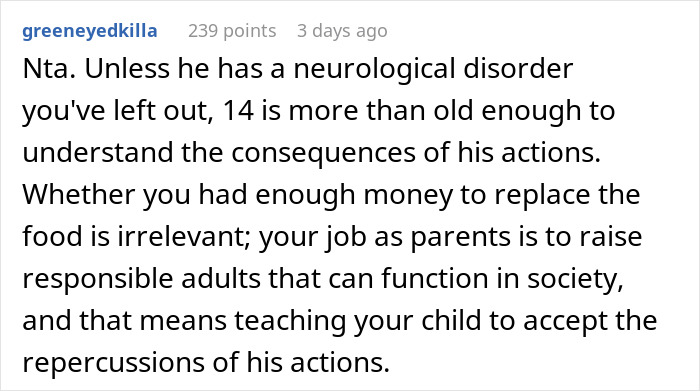



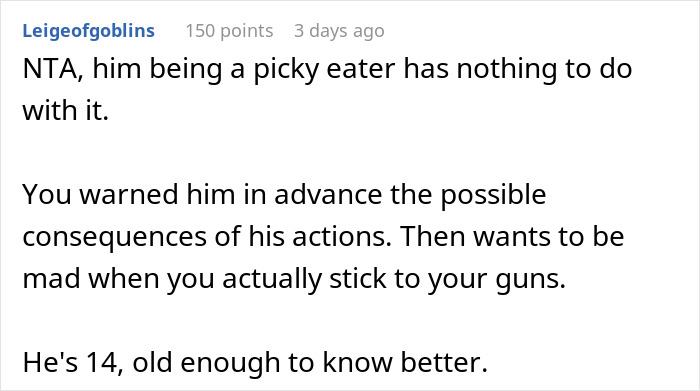




33
21